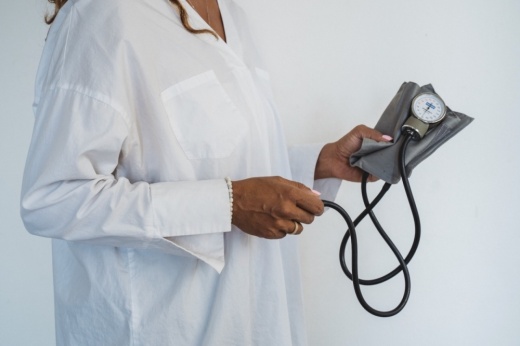Unprecedented demands placed on the nation’s nurses during the pandemic have increased the need for nursing workers in the United States, according to findings from the U.S. Bureau of Labor Statistics.
In an October report, the agency found an additional 275,000 nurses will be needed from 2020-2030. The Department of Labor announced an $80 million Nursing Expansion Grant Program last October to help address the challenges.
Veronica Martin serves as the senior vice president and chief nursing executive at St. Luke’s Health.
In her role, Martin considers different technologies and strategies that help support nurses and the health care system.
For Nurses Week, May 8-12, Martin spoke with Community Impact to discuss the challenges and opportunities coming out of the pandemic for the nursing field. Responses have been edited for length and clarity.
What was most challenging for nurses and the health care field coming out of the pandemic?
I don’t think any of us would have imagined that three years later, we would have ran the course in that time period. For health care, it was establishing what the norm was. How do we get back to basics? Our nurses were tired, worn and in need of this refresh of their commitment and purpose to the profession.
As health care systems, we had to think about how we deliver care. Just because the pandemic moved to the epidemic, it didn’t mean that we didn’t have COVID[-19] patients in the hospital. We still have very few COVID[-19] patients in the hospital even as today.
So how do we exist in what our normal looks like when we’re faced with staffing challenges? Which of course, it’s no secret that many nurses left the workforce during that period of time. We are having to figure out what new deliveries of care models look like. It goes back to defining what our normal is.
How did such challenges affect the nurses who were on the frontlines?
Often in the very early onset of COVID[-19], when we ... absolutely did not have visitors come into the hospitals, the mortality was extremely high at that time. Often that nurse, who was someone’s mother, sister, brother, father, parent, friend or loved one, would be one of the single entities at the bedside when patients’ lives came to an end.
That totality of that along with the uncertainty and learning how to take care of this patient population, while concerned about your own family, really took a toll on our nurses and health care providers across the country.
May is also Mental Health Awareness Month. What has come about in the health care model that might support nurses’ mental health and overall well-being?
There’s a lot of focus on health and wellness in our health system, including resources available for emotional well-being. Our health system has invested in that heavily.
There’s opportunity for our team members to utilize a wellness app. It gives our team members tips and tools to do their own personalized journey around mindfulness and wellness. That’s been something we’ve done that has been really impactful.
How has recruitment been in the nursing field?
We have very intentional plans around recruitment of our nurses back into the workforce. We have a national nurse residency program that provides evidence-based support for new nurses. We provide ongoing education and support for our existing staff for their own professional development.
Over the course of the last nine months or so, we have started to see recruitment pick up. Now you see people wanting to return back to departments that they left for a variety of different reasons, so we have seen some of that pick up.
We have to think about creative scheduling and shifts that meet not only the needs of the organization but the team member as well. The flexible shift is a recruitment tool to tap into the possible missed opportunity in the workforce.
It’s also an opportunity to support the well-being of our team members. No matter what we do, we balance that with the needs of the patient. We still have to make sure we have the right numbers to take care of our patients every day.
What words of advice would you give to those possibly interested in the nursing field?
There are so many pathways and career choices, whether you want to work in a clinical space, or be an educator, in leadership or research. All of those roles still influence the patient in some shape or form.
If you have a desire and passion to help people, then there’s no greater joy that you will be seeing than being a nurse. I would say to the next generation, don’t give up on health care. We need your thoughts, your ideas, your energy, your passion and your enthusiasm.





